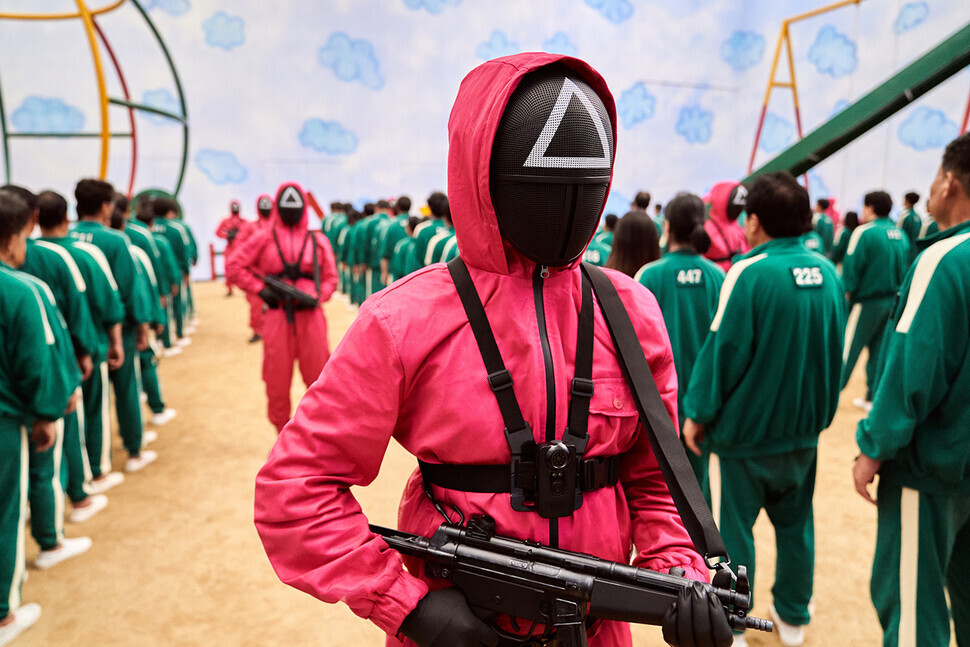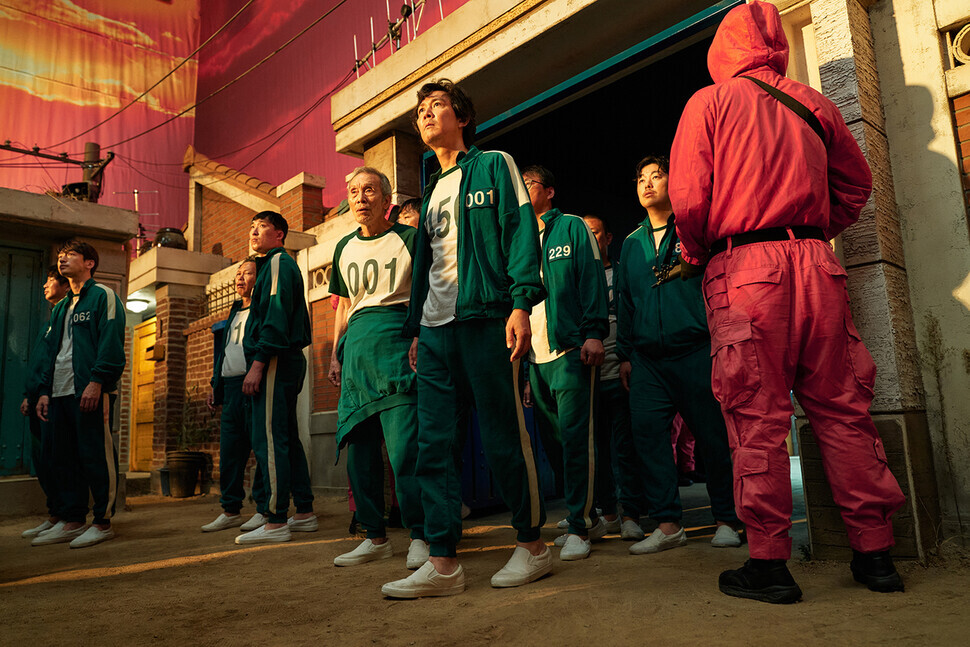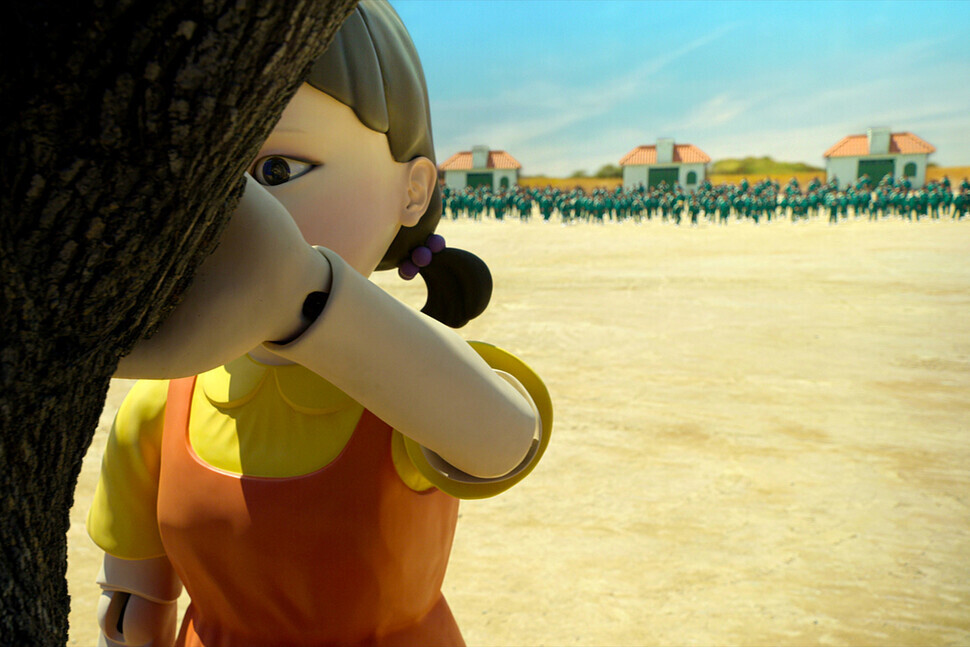hankyoreh
Links to other country sites 다른 나라 사이트 링크
S. Korean series “Squid Game” reaches No. 1 on US Netflix rankings

The South Korean Netflix original series “Squid Game” has turned into a new jackpot, yielding results that some see as outdoing the 45.6-billion-won (US$38.5 million) final prize on the line in the titular game.
“Squid Game,” which debuted on Netflix on Sept. 17, is a series consisting of nine episodes. It was directed by Hwang Dong-hyuk, whose other credits include the films “Silenced” (2011), “Miss Granny” (2014), and “The Fortress” (2017). The lead roles are played by Lee Jung-jae and Park Hae-soo.
The story concerns characters from the dregs of society — left on the brink by massive debts and other factors — as they put their lives on the line in a game that awards 45.6 billion won to its winner.

The series was hotly anticipated in South Korea before its premiere, and it was no surprise to see it at the top of the domestic Netflix rankings. The real shock has been the response overseas.
As of Thursday, the global streaming content ranking site FlixPatrol showed “Squid Game” ranking second worldwide among Netflix shows.
In the past, Korean films like “Space Sweepers” (2021) and “#Alive” (2020) have topped the global charts in the Netflix movie category, but the No. 2 ranking for “Squid Game” was the highest yet for a Korean series. Topping the category in first place was the British series “Sex Education.”
By country, “Squid Game” ranked No. 1 in 22 countries besides Korea, including the US, Mexico, Japan, Thailand, Saudi Arabia and Morocco.
It’s the first time a Korean series has topped the Netflix rankings in the US. The previous best performance was third place for “Sweet Home,” which debuted late last year.
The No. 1 ranking in the US — considered the center of the global content market — is being seen as a symbolic achievement.
Reviews overseas have also been favorable. On the review aggregation site Rotten Tomatoes, “Squid Game” had a “Fresh” score of 100% as of Thursday. The number of professional reviewers assigning ratings was relatively low at seven, but all of them gave positive scores. The “popcorn bucket” rating, showing reviews by the general public, was 89% positive based on 178 reviewers.
On the film information site IMDb, “Squid Game” had a score of 8.3 points out of 10. Anything higher than an 8 is regarded as quite high. Of the 9,229 users assigning scores, a total of 2,693 — around 30% — gave the series a 10.

But while the response overseas has been uniformly positive, reactions in Korea have been mixed.
Those who rate the series favorably cite the Korean touches in its spin on the “death game” genre, an area that has been seldom tackled in Korea. In particular, they point to the unique enjoyment and sympathy evoked as the sad stories of the characters are combined with the tension of the competition and childhood association with honeycomb toffee and games of statues, marbles and the titular “squid game.”
“Death game storylines are nothing new. What sets it apart are the characters it captures,” said film critic Kim Hyo-jeong.
“[The series] also deserves praise for having main characters representing minority groups that have typically been portrayed as ‘losers’ or ‘surplus groups,’ including migrant workers, North Korean defectors and senior citizens,” she added.
Many other viewers say the series resonates with a message that encourages us to reflect on what “fairness” is in a contemporary environment of extreme competition, where people feel like the only way forward is to trample others.

But other viewers have expressed disappointment.
Social media users have grumbled that the series recycles elements from previous “death game” stories like the Japanese films “As the Gods Will” (2014) and “Battle Royale” (2000) and the manga series “Gambling Apocalypse: Kaiji.”
Others have complained that it focuses too much on the characters’ backstories, which they say causes the action to drag. Critics have also complained about exaggerated performances by some of the actors, trite dialogue and the trope of female characters using their bodies to achieve their aims.
Criticisms have been particularly strong among Koreans who have encountered a lot of overseas content in the past. In their view, the series uses an overfamiliar scenario, which it combines with the kinds of melodramatic elements seen in other Korean films and TV series. In other words, the combination of familiar events only leaves them feeling a sense of deja vu.
What’s different this time is that those very elements have helped the series succeed in the competition for overseas viewers. It’s a case where the familiar genre aspects lower the entry barrier, while the characters’ backstories and the colorful visual device symbolizing childhood provide a distinctive kind of appeal.

The sets have drawn particular attention, having been built by hand with minimal use of computer graphics — including the dormitory built out of 456 stacked beds, the pink staircase, and the massive playground.
“The reason foreign viewers loved Bong Joon-ho’s film ‘Memories of Murder’ so much was because of the way it subtly tweaked the ‘thriller’ genre,” Kim Hyo-jeong noted.
“I think they’re going wild for ‘Squid Game’ for similar reasons,” she suggested.
By Suh Jung-min, staff reporter
Please direct questions or comments to [english@hani.co.kr]

Editorial・opinion
![[Column] Has Korea, too, crossed the Rubicon on China? [Column] Has Korea, too, crossed the Rubicon on China?](https://flexible.img.hani.co.kr/flexible/normal/500/300/imgdb/original/2024/0419/9317135153409185.jpg) [Column] Has Korea, too, crossed the Rubicon on China?
[Column] Has Korea, too, crossed the Rubicon on China?![[Correspondent’s column] In Japan’s alliance with US, echoes of its past alliances with UK [Correspondent’s column] In Japan’s alliance with US, echoes of its past alliances with UK](https://flexible.img.hani.co.kr/flexible/normal/500/300/imgdb/original/2024/0419/2317135166563519.jpg) [Correspondent’s column] In Japan’s alliance with US, echoes of its past alliances with UK
[Correspondent’s column] In Japan’s alliance with US, echoes of its past alliances with UK- [Editorial] Does Yoon think the Korean public is wrong?
- [Editorial] As it bolsters its alliance with US, Japan must be accountable for past
- [Guest essay] Amending the Constitution is Yoon’s key to leaving office in public’s good graces
- [Editorial] 10 years on, lessons of Sewol tragedy must never be forgotten
- [Column] A death blow to Korea’s prosecutor politics
- [Correspondent’s column] The US and the end of Japanese pacifism
- [Guest essay] How Korea turned its trainee doctors into monsters
- [Guest essay] As someone who helped forge Seoul-Moscow ties, their status today troubles me
Most viewed articles
- 1[Column] The clock is ticking for Korea’s first lady
- 2[Correspondent’s column] In Japan’s alliance with US, echoes of its past alliances with UK
- 3Samsung barricades office as unionized workers strike for better conditions
- 4After 2 months of delayed, denied medical care, Koreans worry worst may be yet to come
- 5[Column] Has Korea, too, crossed the Rubicon on China?
- 6[Editorial] When the choice is kids or career, Korea will never overcome birth rate woes
- 7Hong Se-hwa, voice for tolerance whose memoir of exile touched a chord, dies at 76
- 8US overtakes China as Korea’s top export market, prompting trade sanction jitters
- 9Constitutional Court rules to disband left-wing Unified Progressive Party
- 10Nearly 1 in 5 N. Korean defectors say they regret coming to S. Korea